
In the early days of the web (the “caveman days” when we were still rubbing two sticks together to make websites out of html) there was a land rush on high level domain names of one or two-words for really general phrases. Things like “realestate.com” and “homes.com” as an example.
At the time, targeting search terms like “real estate investing” was in high demand.
Today, people are a little more sensible (a little more) and they understand that owning a domain name with only one or two words might work if you’re trying to offer generic information to a wide audience but not if you’re trying to market to a specific location-based audience.
Targeting a search term like “real estate investing” makes sense for a wider, more generic audience, while targeting a location-based search term makes far more sense for most investors who are buying, renting, and selling properties.
Here’s What I Mean By A Location-Based Search Term
If you live in Chicago and you want to try a new restaurant, you wouldn’t likely sit down at your computer and just type “restaurant” into the search engine.
You know you may get a whole bunch of links… none of which will be relevant to you.
Instead, you type something like “Chicago restaurants” or perhaps even something more specific, such as “pizzeria” and the name of a neighborhood in Chicago.
And the restaurants that show up for that search result? They were smart enough to use location-based SEO to optimize their websites. They built their sites around the location-based keywords that you used to search.
Yes…
… Google is getting better and better at creating location based search results on the more generic topics where people are likely looking for something in the city they’re searching… like “restaurants”, “plumbers”, and “real estate agents”. But for the sake of what most real estate investors want to rank for, Google hasn’t quite figured out how to know the most relevant location to serve up results for terms like “investment properties”… so they show national results.
Location Based Results On A General Term I Searched…
(I’m in Roseburg Oregon)
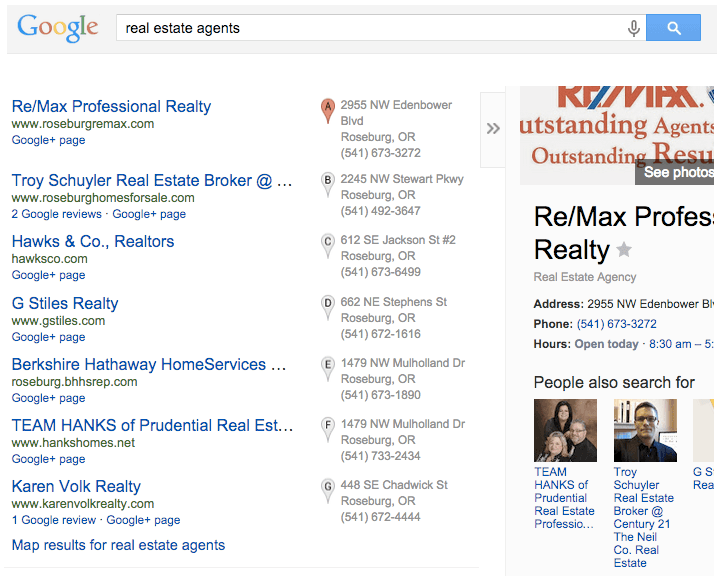
Google Serving Up Location Based Results… on the more generic topic that tend to be very local in nature. Like agents, restaurants, plumbers, etc.
The same idea applies to real estate investors. You have a location-based service and your website should be optimized for your location.
You’re not targeting a general, national audience with your generic information; you’re targeting a location-specific audience with location-specific information. In other words, you’re offering to buy, rent, or sell a property in a specific place.
To illustrate that… here’s what pops up when I search a general term like “sell my house fast” in Google.
Notice These Results Are NOT Location Based
Which means the results are very un-targeted and very hard to rank for… but this is the main SEO mistake most real estate investors make. Not targeting their website and pages to specific locations your prospects may be needing your services in.
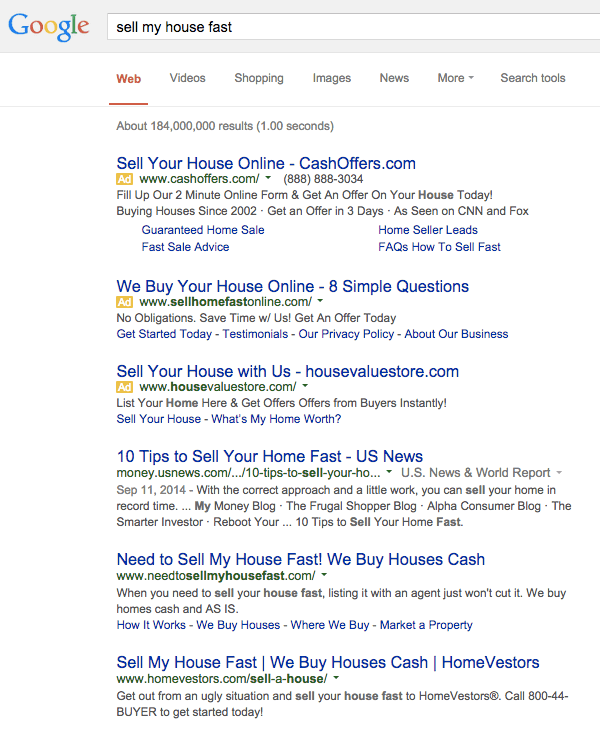
Google hasn’t learned how to build in location based results for non-location specific searches that are important to real estate investors.
Or a phrase like “we buy houses in Eugene, Oregon“. That’s a location specific search.
To help you take advantage of “local SEO“, here are 6 simple tips to master location-based SEO on your real estate investing website:
1. Be As Specific In Your SEO As Your Audience Will Be In Their Search
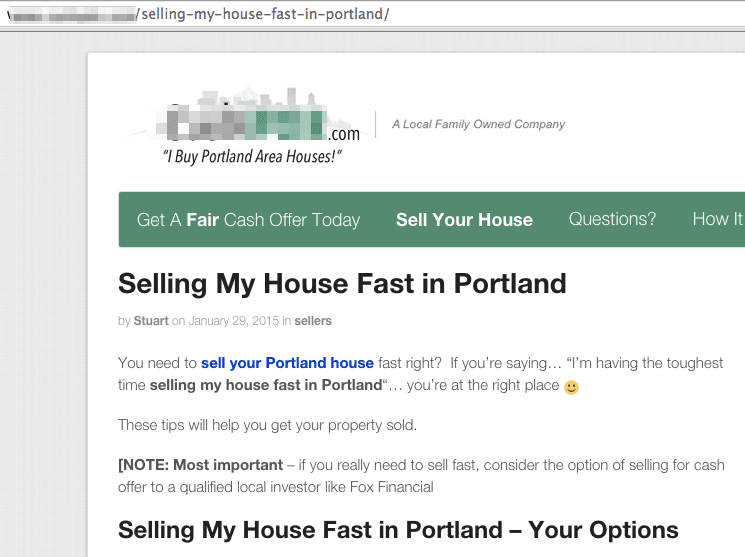
A Location Specific Page… this page ranks very well in the Portland market and is starting to pull in some leads now. We got it there by building out pages for each specific city / market he buys houses in, optimizing them, and letting the SEO gods do their thing.
One investor I worked with wanted to improve his local SEO.
I asked him what location he served and he gave me the name of the county he worked in. I asked him if his prospective home sellers would search for the name of that county when looking to sell their home.
It was an “aha!” moment for him when he realized that they would more likely use the name of their city – not the county – to find the information they were after.
NOTE: We base all of our lead generation decisions on data. So in some areas, people do search by county… most they don’t. Just get to know the ways that house sellers, buyers, tenants, etc. talk about the area they live in. If they use “Berks County” to refer to their area all of the time… it may be a good idea to setup a page optimized for the county as well.
2. Consider Multiple Pages – Or Even Multiple Websites – For Multiple Locations
Chances are, you serve more than one location – perhaps multiple neighborhoods, towns, or cities in your area.
Depending on the amount of business you expect to get from each one, you might consider creating multiple pages (each page optimized for a different town or city) or even multiple websites if the markets are completely different and it doesn’t make sense to keep them on the same website.
Of course it probably doesn’t make sense to create a site for every single municipality in the area you serve but you should probably focus on the major ones (at least at first).
3. Don’t Just Think Location… Think Action
A location is only part of it.
Of course your SEO should not only be built around a location but also needs to be built around the appropriate verb.
What verb is your audience searching for?
Sellers are probably using the word “sell”, tenants are probably using the word “rent”, and buyers might be using words like “buy” or “invest” (depending on what kind of buyers they are). Creating a location-based SEO strategy needs to include the right location but also the right verb for the people you’re reaching.
In fact, our research has shown that for every category of lead the average real estate investor is looking for (motivated sellers, cash buyers, tenants, lenders, etc.)… there are just a handful of “verbs” that those prospects are going to Google to search.
4. Extend Your Local SEO Beyond Your Website
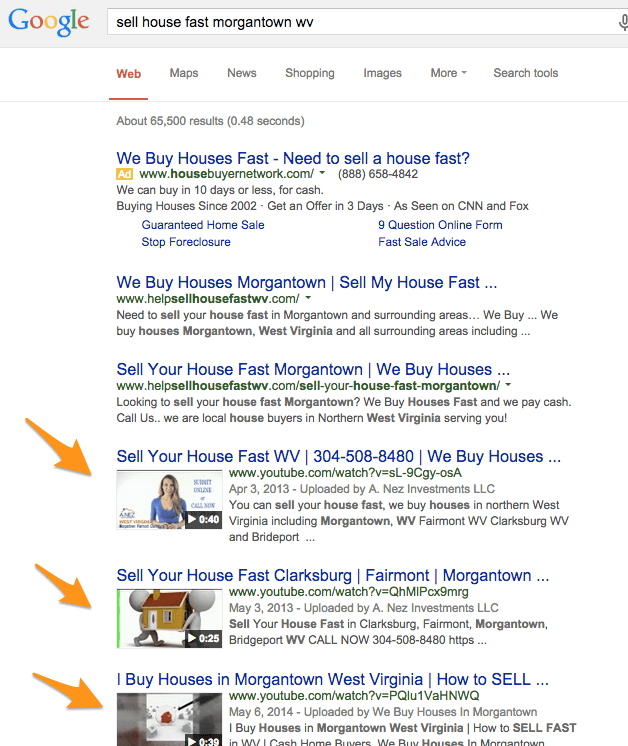
The same investor dominating the top 5 results in Google… This investor is dominating the top 5+ results in Google for this location-based search phrase in his market. He got his site ranked #1 and #2, then turned on the afterburners by optimizing Youtube videos for the same location-based search phrases.
Although you should optimize your website with location-based SEO, it shouldn’t stop there.
Use a service like Google My Business to help you place your business on a map, just as the real estate agents in the first picture above did.
And it shouldn’t stop there.
You can apply the same strategy to other sites and accounts, including Twitter, Facebook, LinkedIn, Google+, Instagram, Pinterest and more.
Each of these sites is an opportunity to create some location-based SEO. (For example, if you specialize in selling homes in Chicago, you may consider a Twitter handle like @BuyChicagoHomes.
Optimizing your Youtube videos for those local SEO terms your prospects are typing in will help you get in front of the people that matter… the people you can actually do business with and help.
5. Extend Your Location-Based SEO With Additional Differentiation
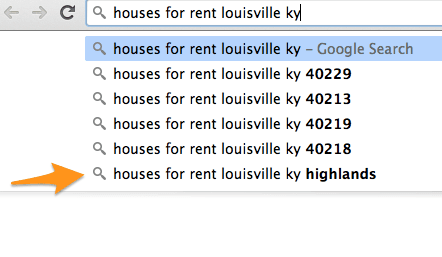
People are searching by neighborhood sometimes… In this quick search I did in Google, you’ll notice the suggestions Google gives me.
Notice in the picture above the suggestions Google is giving me.
Those suggestions are based on Google’s search data… and enough people type those phrases each month to matter.
So if you had a house for rent in the Highlands… I’d create a page on your website optimized for that very hyper-specific local SEO phrase… plus I’d also spin up a Youtube video for that phrase.
In highly competitive markets, you’ll need more than just location to differentiate.
If you work in a highly competitive market, then simply optimizing with location-based SEO alone might not be enough. You may need to become even more granular in your location (drilling down to the neighborhood instead of just the city) or add something else to your Unique Selling Proposition (USP) to help you stand out from the crowd.
You’d be surprised how specific some web searchers are getting in their searches.
6. Make Sure You Have A Call To Action!

Notice on this note buying website the multiple crazy clear calls to action? These are on every page on the website…
Location-based SEO is an indicator that someone is ready to do business.
They’re highly targeted.
And in the area you can actually help them.
A home seller who wants general information about the idea of selling their home might search “how do I sell my home for cash?” but that same seller will be more likely ready to act when they to search “how do I sell my Chicago home for cash?”.
So make sure your website is structured in a way that it will convert a visitor into a lead… and a deal well.
Get Started Now To Master Location-Based SEO On Your Real Estate Investing Website
As an investor working within today’s web environment, your best strategy to gain the attention of prospective clients in your market is to use location-based SEO.






